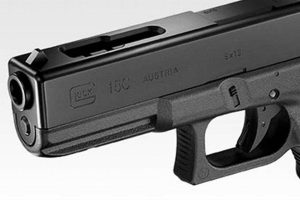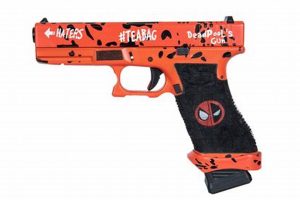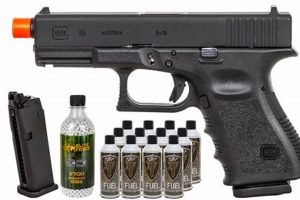The question of whether the Austrian firearms manufacturer directly produces replicas designed for recreational skirmishes is common among enthusiasts. These replicas typically utilize compressed gas or springs to propel plastic projectiles, simulating the appearance and handling of authentic models. The proliferation of these items has created a substantial market catering to both recreational users and training facilities.
The inquiry holds significance for consumers seeking products officially licensed and endorsed by the original manufacturer, potentially ensuring a higher degree of realism and quality. Historical context reveals that firearm manufacturers often collaborate with specialized replica companies to expand brand reach and capitalize on the growing popularity of simulated firearms activities. This collaborative approach allows for the production of detailed replicas while circumventing potential legal and logistical challenges associated with manufacturing and distributing airsoft devices directly.
This article will delve into the specifics of the relationship between the Austrian firearms manufacturer and the manufacturers of these replicas, exploring the licensing agreements, product availability, and factors influencing consumer choice in this market. Furthermore, it will examine the characteristics and options available to consumers interested in acquiring authentic-looking replicas.
This section outlines crucial factors to consider when acquiring airsoft pistols replicating the design of Glock firearms. Due diligence ensures a satisfactory purchase and informed understanding of the market.
Tip 1: Licensing and Authenticity Verification: Prioritize models possessing official licensing agreements. Licensed products frequently exhibit higher fidelity to the original firearm’s design, markings, and dimensions. Consult the manufacturer’s official website or packaging for licensing verification.
Tip 2: Manufacturer Reputation Assessment: Research the track record of the airsoft manufacturer. Investigate customer reviews, product durability reports, and historical performance to gauge the reliability and quality of their offerings.
Tip 3: Material Quality Evaluation: Examine the materials used in construction. Higher-quality materials, such as reinforced polymers or metal alloys, generally provide increased durability and a more realistic feel. Avoid models constructed primarily from inexpensive, brittle plastics.
Tip 4: Internal Mechanism Inspection: Understand the internal mechanisms employed. Gas blowback systems often offer a more realistic shooting experience, while electric systems provide consistent performance and ease of use. Research the specific system and its maintenance requirements.
Tip 5: Legal Compliance Verification: Ascertain compliance with all applicable local, regional, and national regulations regarding airsoft ownership, use, and transportation. Adherence to legal requirements is paramount.
Tip 6: Aftermarket Part Availability: Assess the availability of aftermarket parts and accessories. Readily available upgrades and replacement parts can extend the lifespan of the airsoft pistol and enhance its performance. Common upgrades include improved barrels, hop-up units, and magazines.
Careful consideration of licensing, manufacturer reputation, material quality, internal mechanisms, legal compliance, and aftermarket support allows for the selection of a high-quality, authentic-looking airsoft pistol. Informed purchasing decisions enhance user satisfaction and ensure a responsible approach to the airsoft hobby.
The subsequent section will address common misconceptions and provide clarification on relevant legal and safety considerations pertaining to airsoft replicas.
1. Licensing Agreements
Licensing agreements are paramount in determining whether an airsoft pistol accurately replicates the design and trademarks of Glock firearms. The absence of a formal licensing agreement indicates that the airsoft product is not officially endorsed or authorized by Glock. This often results in discrepancies in appearance, dimensions, and markings compared to the authentic firearm. The presence of a licensing agreement ensures that the airsoft manufacturer adheres to specific standards set by Glock, guaranteeing a higher degree of realism and potentially improved quality. For instance, Umarex, a prominent airsoft distributor, holds licensing agreements with Glock, allowing them to produce and distribute airsoft pistols bearing the Glock trademark. This enables consumers to purchase replicas that closely resemble the original firearms.
Without licensing agreements, manufacturers may attempt to circumvent trademark laws by making subtle alterations to the design, which can compromise the overall authenticity and value of the replica. Furthermore, licensed products frequently undergo quality control measures mandated by the original manufacturer, reducing the likelihood of defects and ensuring consistent performance. The benefits extend beyond mere aesthetics; licensed airsoft pistols are often favored for training purposes due to their accurate dimensions and weight, allowing for realistic handling and manipulation practice.
Therefore, understanding the role of licensing agreements is crucial for consumers seeking accurate and reliable Glock airsoft pistols. The presence of such an agreement signifies an official endorsement and adherence to quality standards, increasing the likelihood of a satisfactory purchase and a realistic training experience. Failure to verify the existence of a licensing agreement may lead to the acquisition of a substandard replica with compromised authenticity and performance. Verifying license information should be a primary step in the acquisition process.
2. Manufacturing Partners
The inquiry of whether Glock directly manufactures airsoft pistols necessitates an examination of its relationships with manufacturing partners. Glock, primarily focused on the production of firearms, typically licenses its trademarks and designs to specialized airsoft manufacturers. These partners, possessing expertise in airsoft technology and manufacturing processes, produce replicas under Glock’s authorization. This division of labor allows Glock to expand its brand presence in the airsoft market without directly engaging in the complexities of airsoft production. For instance, Umarex, a well-known airsoft distributor, collaborates with various manufacturing partners to produce Glock-licensed airsoft models. These manufacturing partners are responsible for the actual production, assembly, and quality control of the airsoft pistols. The quality and authenticity of Glock airsoft pistols are therefore directly influenced by the capabilities and standards of these manufacturing partners.
Understanding the role of manufacturing partners is critical for consumers seeking authentic Glock airsoft replicas. Evaluating the reputation and track record of the manufacturing partner can provide insights into the expected quality and performance of the product. Factors such as the materials used, the precision of manufacturing processes, and the internal mechanisms employed are directly determined by the manufacturing partner. Furthermore, the relationship between the licensee (e.g., Umarex) and the manufacturing partner can influence the level of quality control and adherence to Glock’s specifications. Some manufacturing partners may prioritize cost-effectiveness over quality, resulting in replicas that deviate from Glock’s standards. Conversely, other manufacturing partners may invest in advanced manufacturing techniques and materials, producing airsoft pistols that closely mirror the original firearms.
In conclusion, Glock’s involvement in the airsoft market relies heavily on manufacturing partners. These partners are responsible for the actual production of Glock airsoft pistols, and their capabilities significantly impact the quality, authenticity, and performance of the replicas. Consumers should therefore consider the reputation and track record of the manufacturing partner when assessing the value and suitability of a Glock airsoft pistol. This understanding is essential for making informed purchasing decisions and ensuring satisfaction with the product.
3. Authenticity Standards
The inquiry regarding Glock’s direct involvement in airsoft pistol manufacturing is inextricably linked to the authenticity standards maintained within the airsoft industry. These standards, encompassing replication accuracy, material quality, and functional similarity, dictate the degree to which an airsoft replica mirrors the genuine Glock firearm. When Glock licenses its trademarks and designs to airsoft manufacturers, these licensing agreements often include stipulations regarding authenticity. The more stringent these stipulations, the closer the resulting airsoft pistol will resemble the original Glock in appearance, weight, and handling. For example, officially licensed Glock airsoft pistols from Umarex are expected to adhere to specific dimensions and feature Glock markings, ensuring a high level of realism. These authenticity standards directly influence the perceived value and utility of the airsoft replica, particularly for training purposes where accurate simulation is paramount.
Conversely, airsoft pistols lacking official Glock licensing agreements may deviate significantly from these authenticity standards. These unlicensed replicas might exhibit inaccurate dimensions, simplified features, or variations in material quality to reduce manufacturing costs or circumvent trademark restrictions. The result is often an airsoft pistol that bears only a superficial resemblance to a Glock, compromising its suitability for realistic training and diminishing its appeal to collectors or enthusiasts seeking accurate replicas. The prevalence of unlicensed replicas underscores the importance of scrutinizing authenticity standards when evaluating Glock airsoft pistols. Careful examination of product specifications, licensing information, and customer reviews can help discern the level of authenticity and inform purchasing decisions.
In summary, the connection between Glock’s involvement in airsoft pistol manufacturing and authenticity standards is a critical consideration. The existence and enforcement of these standards directly impact the quality, realism, and overall value of Glock airsoft replicas. By prioritizing officially licensed products and carefully assessing authenticity criteria, consumers can ensure they are acquiring airsoft pistols that accurately represent the Glock brand and meet their specific needs. The challenges associated with identifying and verifying authenticity highlight the importance of diligent research and informed decision-making in the airsoft market.
4. Replication Quality
Replication quality serves as a crucial metric when evaluating airsoft pistols mimicking Glock firearms, particularly when considering if the firearms manufacturer directly produces these replicas. This quality encompasses various facets that determine how closely the airsoft version resembles the authentic firearm.
- Material Accuracy
The composition of materials used significantly affects replication quality. High-quality replicas utilize polymers and metals that closely match the texture, weight, and appearance of those found in genuine Glock pistols. Inferior replicas may employ lower-grade plastics or metals, resulting in a less realistic feel and reduced durability. For example, a high-quality replica might use fiber-reinforced nylon polymer for the frame, mirroring the Glocks construction, whereas a lower-quality replica may use ABS plastic. Material accuracy directly impacts the overall perception and handling of the airsoft pistol.
- Dimensional Precision
Accurate replication of dimensions is essential for compatibility with accessories and for realistic handling. Precise dimensions ensure that holsters designed for Glock firearms can accommodate the airsoft replica. Furthermore, proper dimensions contribute to the correct grip angle and overall ergonomics, providing a more authentic shooting experience. Inconsistencies in dimensions can lead to malfunctions, incompatibility with accessories, and a compromised training experience. This is crucial for law enforcement or military training where using a replica is beneficial.
- Functional Similarity
The degree to which the airsoft pistol replicates the functionality of the real firearm is a significant aspect of replication quality. This includes the operation of the trigger, magazine release, slide, and safety mechanisms. A high-quality replica will mimic these functions closely, providing a realistic training or simulation experience. Lower-quality replicas may simplify or omit certain functions, diminishing their realism and utility. For instance, some airsoft replicas feature a functional trigger safety, similar to Glocks Safe Action system, while others lack this feature. This impacts the overall handling and training potential of the airsoft replica.
- Markings and Detailing
Authentic markings and fine detailing are critical for visual fidelity. High-quality replicas accurately reproduce Glock’s trademarks, serial numbers, and other identifying marks. These details contribute significantly to the realism of the replica and are important for collectors and enthusiasts. Inferior replicas may have inaccurate or missing markings, which detracts from their authenticity and value. The presence of correct markings often indicates a licensed product, signifying adherence to Glock’s quality standards and brand integrity. A good marking are hard to remove and it is precisely at their real place.
These facets of replication quality are intrinsically linked to the question of whether Glock directly manufactures airsoft pistols. The presence of high replication quality typically indicates a licensed product manufactured under stringent quality control measures, even if not directly by Glock. Conversely, lower replication quality often suggests an unlicensed or lower-quality product, reflecting a less direct involvement or oversight from the firearm manufacturer. Ultimately, replication quality serves as a tangible indicator of authenticity and a key factor in determining the value and suitability of an airsoft replica for its intended purpose.
5. Legal Compliance
Legal compliance forms a critical framework within which the airsoft industry operates, significantly impacting the availability, distribution, and ownership of replicas patterned after firearms, including those resembling Glock models. The question of whether the firearms manufacturer directly produces airsoft pistols is intrinsically linked to adherence to diverse regulations governing these products. These regulations often dictate manufacturing standards, import/export restrictions, and permissible modifications.
- Import/Export Restrictions
Many jurisdictions impose strict controls on the import and export of items resembling firearms, irrespective of their functionality. Airsoft replicas, due to their visual similarity to genuine firearms, frequently fall under these restrictions. Whether a manufacturer, including the firearms manufacturer itself, is involved necessitates navigating these complex trade regulations. Failure to comply can result in seizure of goods, fines, or legal penalties. For instance, some countries require specific markings to differentiate airsoft replicas from real firearms to facilitate customs clearance. These requirements necessitate adherence to specific marking methods and the placement of markings on the replicas.
- Product Safety Standards
Airsoft pistols are subject to product safety standards designed to protect consumers from injury. These standards may dictate material composition, projectile velocity limits, and safety mechanism requirements. Manufacturers must ensure their products meet these standards to legally market and sell them within a given jurisdiction. For example, some regions mandate that airsoft pistols incorporate blaze orange tips to distinguish them from actual firearms. Compliance with these safety standards requires manufacturers to implement rigorous testing and quality control procedures. This can often lead to high production cost.
- Ownership and Use Regulations
Regulations governing the ownership and use of airsoft pistols vary significantly across jurisdictions. Some regions require permits or licenses for ownership, while others restrict usage to designated areas or age groups. Manufacturers and retailers must comply with these regulations to avoid legal liabilities and ensure responsible product distribution. For instance, some cities prohibit the open carry of airsoft pistols in public places, while others allow it with certain restrictions. Manufacturers may need to provide clear warnings and instructions regarding legal use to mitigate potential liability. Minors are prohibited to use airsoft guns unsupervised by an adult.
- Trademark and Intellectual Property Laws
The production and distribution of airsoft replicas must comply with trademark and intellectual property laws to prevent infringement. Unauthorized use of trademarks, designs, or patents can result in legal action. If the firearm manufacturer decides to produce airsoft pistols directly or license their production, they must navigate these legal considerations to protect their intellectual property rights. For example, the use of a Glock trademark on an airsoft pistol requires a licensing agreement with Glock to avoid infringement. Compliance with these laws necessitates careful consideration of intellectual property rights during the design, manufacturing, and marketing phases.
The complexities of legal compliance underscore the importance of manufacturers’ adherence to diverse regulations when producing and distributing airsoft replicas. Whether or not a firearm manufacturer is directly involved, adherence to these regulations remains paramount to ensure legal and responsible product distribution. Failure to comply can lead to significant legal and financial consequences, impacting brand reputation and market access. Legal compliance, therefore, is an essential consideration when examining the production and distribution channels of airsoft pistols replicating specific firearm designs.
Frequently Asked Questions Regarding Glock Airsoft Pistols
This section addresses prevalent inquiries concerning airsoft replicas of Glock firearms, providing clarity and dispelling common misconceptions.
Question 1: Does Glock directly manufacture airsoft pistols?
No. Glock primarily focuses on the production of genuine firearms. Airsoft replicas bearing the Glock trademark are typically manufactured by licensed partners. Umarex, for example, holds licenses to produce Glock airsoft models, which are then manufactured by other companies.
Question 2: Are Glock airsoft pistols authentic replicas?
Authenticity varies depending on the licensing agreement and the manufacturer. Officially licensed models generally exhibit a higher degree of realism and adherence to the original firearm’s design. Unlicensed products may deviate from Glock specifications.
Question 3: Where can authentic Glock airsoft pistols be purchased?
Authentic Glock airsoft pistols can typically be acquired from reputable airsoft retailers, sporting goods stores, and online marketplaces that carry licensed Umarex products. Verifying the presence of official licensing is advisable before purchase.
Question 4: What legal considerations apply to Glock airsoft pistols?
Legal regulations governing airsoft pistols vary by jurisdiction. Compliance with local, regional, and national laws pertaining to ownership, use, and transportation is essential. Some areas may require specific markings or restrictions on usage.
Question 5: How does one verify the authenticity of a Glock airsoft pistol?
Authenticity can be verified by examining the product for official Glock trademarks, licensing information, and manufacturer details. Comparing the replica to images of the genuine firearm and consulting reviews can also aid in verification.
Question 6: What materials are commonly used in Glock airsoft pistols?
Airsoft pistols replicating Glock designs often utilize a combination of materials, including reinforced polymers and metal alloys, to simulate the weight and feel of the original firearm. The specific materials used can impact the replica’s durability and realism.
Key takeaways emphasize the importance of licensed products, adherence to legal requirements, and careful verification of authenticity when acquiring Glock airsoft pistols.
The next section will provide a concluding summary of the key points discussed in this article.
Conclusion
This exploration clarifies that Glock does not directly manufacture airsoft pistols. Instead, the company licenses its trademarks to other entities, such as Umarex, who then contract with manufacturing partners to produce these replicas. Authenticity, quality, and legal compliance are critically dependent on these licensing agreements and the standards maintained by the manufacturing partners. Consumers must exercise due diligence to verify licensing and assess product specifications.
The intricacies of this market underscore the importance of informed decision-making. Continued vigilance regarding product authenticity and adherence to legal regulations will ensure a responsible and satisfying experience. As the airsoft market evolves, understanding these relationships will remain essential for consumers seeking accurate and compliant replicas of Glock firearms.



![Best Electric Airsoft Glock 18C: [Year] Guide & Review Safem Fabrication - Precision Engineering & Custom Manufacturing Solutions Best Electric Airsoft Glock 18C: [Year] Guide & Review | Safem Fabrication - Precision Engineering & Custom Manufacturing Solutions](https://airsoftica.com/wp-content/uploads/2025/06/th-4265-300x200.jpg)
![Airsoft Glock: Does Glock Make Airsoft Guns? [Facts] Safem Fabrication - Precision Engineering & Custom Manufacturing Solutions Airsoft Glock: Does Glock Make Airsoft Guns? [Facts] | Safem Fabrication - Precision Engineering & Custom Manufacturing Solutions](https://airsoftica.com/wp-content/uploads/2025/06/th-4240-300x200.jpg)


